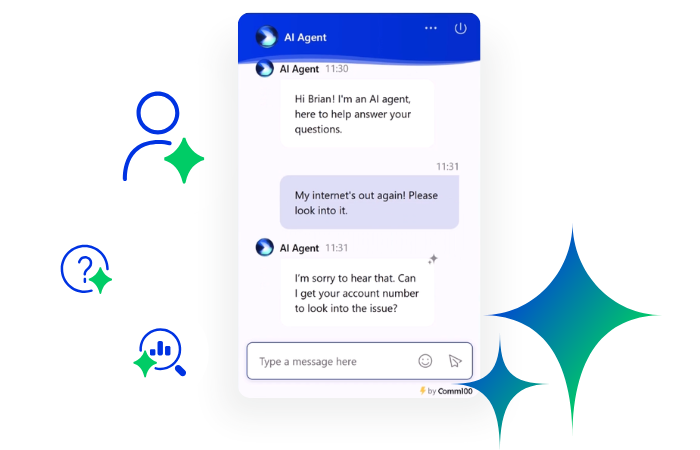So you’ve decided to move your customer service team into the 21st century, getting them ready to chat for the first time. Congratulations!
Luckily, implementing a live chat system on your website is often pretty simple.
But what do you need to do to prepare your agents to use the system?
You could simply give technical training on the new system, then let your agents loose.
This could mean though that agents aren’t prepared enough to adapt their existing customer service knowledge to the live chat system – which could cause negative encounters with customers through misinterpreted comments, slow chats, or grammar gaffes.
Because of this, it’s important to back up systems training with training focused on the customer experience of your live chat customers, helping your agents to understand the service impacts of your new channel.
So if you haven’t yet thought about giving your agents more than just straightforward systems training, here are five things to consider when giving effective chat support training to your team.
1. Words, Tone and Body Language
Professional customer service agents understand that all face to face communication is made up of three different elements: Words, tone, and body language.
Telephone communication can be tricky since agents can’t rely on assessing a customer’s body language to get more insight into what they’re thinking and feeling.
Extra attention needs to be paid to words spoken, and the tone they’re spoken in, to accurately ‘read’ a customer. And when communicating back to customers, words and tone need to be delivered and moderated carefully in order to communicate in a clear way.
Live chat presents extra challenges. Without being able to hear a customer speaking or see their body language, how can you read the subtleties of their communication to truly understand the meaning of what they’re saying? And how can you demonstrate listening, friendliness or build rapport by simply exchanging typed messages?
Well, attention to wording here becomes absolutely crucial in allowing you to do all of this. Agents need to step up their communication a notch to consider sentence structure, word choice, and conversation flow in building and assessing the intent of a communication.
Top Tips: Hold a short training session introducing the Mehrabian communication model and asking your agents to consider the impacts of not having tone or body language to help them communicate. Questions to ask include: What problems could arise through relying on just words to communicate with? How could miscommunication occur? How could this be prevented?
2. Live Chat School
If you’ve ever been on any formal, ‘classroom-based’ training session, you’ll know that the most important part of learning is actually applying the knowledge you’ve learned in the workplace. Indeed, one of the most highly-regarded training models there is states that as much as 70% of learning occurs through hands-on, on the job work, not through structured training sessions.
That’s not to say there isn’t a place for formal training sessions – just that the most effective adoption of live chat expertise comes through checking and facilitating learning while your agents are using the software. Building in an extended training period after initial live chat training is a great way to give your agents the space to experiment in their approach until they are handling the software like experts.
Top Tips: Introduce ‘Live Chat School’ after initial live chat training by setting standards for your team to attain, and assessing them throughout the extended training period. Once they hit targets for customer satisfaction, chat length, and/or utilization, ‘graduate’ them to your regular quality assurance program.
3. Spelling and Grammar
When you hired your telephone based agents, it’s unlikely that you paid much attention to their writing, spelling and grammar skills.
You may have held mock customer interactions with them, listening to how they sound on the telephone, their ability to reassure and assure customers through careful vocal communication.
Live chat doesn’t make these skills redundant. However, it does require agents to brush up on their writing skills. Agents with sloppy writing or bad grammar reflect badly on your company, causing customers to question the abilities and professionalism of your staff.
Top Tips: Hold a ‘Grammar Police’ themed quiz, testing agents on common grammatical mistakes and giving a prize to the top ‘Grammar Cop’. Back this up by ensuring that agents have access to a style guide which sets the standard for correct spelling, capitalization, punctuation and sentence structure.
4. Live Chat Scripts
Most telephone-based agents will have a set of standard scripts they use in conversations, for example, their greeting and closing messages to customers.
Live Chat as a system is unique in that any of these scripts can be added into the agent console, saving them time in their interactions.
Live chat scripts can also be used to speed up interactions and improve quality outside of these standard scenarios – for example, by adding scripts to discuss product features without missing any key details, or for giving complete instructions on how to reset a password.
It’s important for you to acknowledge how important scripts can be in increasing quality and saving time, and give your agents the chance to think creatively about how they can develop scripts that work well for them.
Top Tips: Hold a scripting workshop for your agents. Examine what scripts are already used, what scenarios new scripts could be written for, and the advantages of these. Make sure to discuss potential time savings and the reduction in needing to repetitively type out the same statements for different customers. You can also use some live chat script examples to prompt discussion – see our eBook for ready to use examples.
Powerful live chat software
Offer real-time, personalized, efficient support that your customers and agents will love at 1/3 the cost of voice support.
Learn more
Comm100 Live Chat
5. In The Live Chat Customer’s Shoes
In their telephone based work, your agents will already be pretty clear on the factors of their service which impact the customer experience. Wait times, clarity of communication and transfers between departments are prime examples of situations which can destroy the customer experience if handled badly – or enhance the customer experience, if done really well.
Live chat software presents extra situations which can add to, or damage the experience of your customers. The time taken to respond to a message, the use of canned responses, and the ability to share screens can all add new dimensions to the customer experience that your agents probably haven’t considered.
Top Tips: Hold an ‘In their shoes’ training session. Split your agents into two groups and ask them to take the viewpoint of one of your customers. Ask one group to imagine and script the best possible customer experience that could be had while using live chat for a range of real-life scenarios. Ask the other group to script the worst experience which could be had. Once done, ask them to share and question them on their decisions: what impact do certain agent actions have on live chat? Why do these actions occur -through accident, or intent? How can they be mitigated against (if bad) or adopted (if good)?
Do you have any other ideas on how to build customer-focused training for a new live chat team? Let us know your comments.
Download now: 101 Ready-to-Use Live Chat Scripts for Both Sales and Customer Service
The downloadable contains scripts for all kinds of scenarios, ranging from greetings to collecting personal information, and can help your live chat team deliver more efficient, quality support immediately.
Download now
eBook








